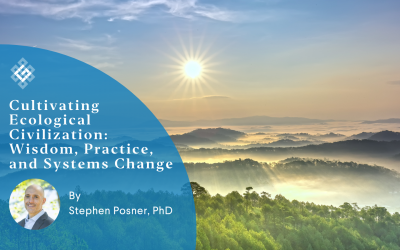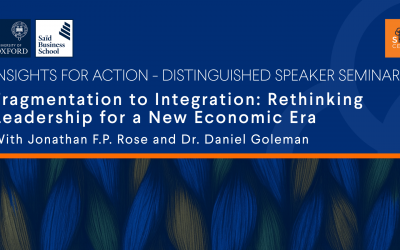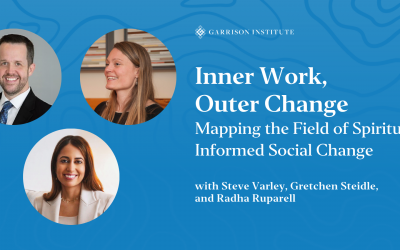In a recent “Garrison Talks at the JCC” event in New York City, “Bridging Spirituality and Activism,” Zen teacher angel Kyodo williams and meditation teacher Sharon Salzberg discussed challenging questions about the relationship between personal and social transformation. How do racism and privilege prevent our collective awakening? How can each one of us affect the shortcomings not only of our own minds but also of our communities?
Leading up to this event, we spoke with williams about how she approaches these questions and others in her new book, Radical Dharma: Talking Race, Love, and Liberation.
The central message of Radical Dharma is that personal and social transformation must be brought together, with an extra emphasis on those who have been historically marginalized. Do I have that right?
That’s certainly an aspect of it, but what I mean first and foremost is that the way that spiritual truth has been held in this country has been partial. People have chosen to look at particular aspects of spiritual truth. The statement that I’m trying to make in Radical Dharma is that we actually have to have a complete lens on the way in which we show up for everything and that includes how we show up in our social presentation.
Can you say more about the particular aspects of spiritual truth that have been emphasized? What’s missing?
What’s been emphasized are personal and, to some extent, interpersonal spheres of behavior and understanding. If something is inside the known sphere of my comfort zone—or relative comfort zone—then I can look at it. If it fits inside of all the ways that I have chosen to organize my worldview, then I can apply the spiritual teachings. But if it doesn’t fit inside of my worldview, then I won’t apply the teachings.
Radical Dharma‘s message is about applying spiritual teachings and truth to the entire sphere of what makes up our lives. An example of the sort of thing I’m talking about is when people talk about “right livelihood,” but they don’t look at capitalism. They think, “Within capitalism, I’m going to apply these teachings.” This approach takes capitalism as a given. This is a neat cordoning off of my known sphere of awareness. I might add that this works in multiple directions. Inside social justice activist circles, someone might apply their sense of truth towards social liberation, but not necessarily to their own self-care.
Many of us find ourselves participating in systems that lead to suffering—we’ve been talking about capitalism—and want to do something about it but don’t know where to start. How do you do something about capitalism?
There is wisdom in asking, “How do I respond given my particular situation and location and reality?” That question arises out of the choice to see things clearly. How one person should approach answering that question would be different for another person—for example, it’s going to look differently for people in different places on the the income scale. Another example is that I’m not ready to tell someone that is an Alaska Native to be vegan. On the other hand, most of the people that have free access to protein-rich food choices should probably step away from so much meat consumption.
There is wisdom that arises out of the willingness to look at your situation clearly. You can look at your situation in a radical way—look at the systems that compose your reality—as opposed to picking and choosing what you pay attention to.
Can you say more about the importance of bringing personal and social transformation together? Do you approach them in different ways?
In some ways they are the same and in some ways they are different. For the aspects of a social problem that touch you personally, teachings on personal liberation are helpful. There’s a way to avoid becoming so overwhelmed by an emotion so that you’re unable to actually see a thing clearly. But that does not mean that all will be resolved by navigating only our personal anger when there is also a reason to have collective anger—and that collective anger is powerful resource of energy that can be directed. For example, the Black Lives Matter movement had to maintain a certain kind of stance that we would call angry from a social perspective in order to sustain enough energy to be taken seriously. The organizers didn’t allow the anger to consume them personally and individually, but the movement could not suddenly run off to Martin Luther King forms of non-violence and peace and happiness, because we’re not there yet.
There’s a kind of arc in our personal anger that can allow us to transmute it into a powerful response on the collective level. And in many ways, in order to get to the collective levels, we actually have to do the work internally so that it is not consuming us personally. In fact, it becomes sort of like faking the anger. You inhabit a space, but you’re not attached to that space as representing who you are, who we are, or whoever the “they” collective is. You can say that the expression of collective anger is actually skillful given certain conditions.
It sounds like you have to be able to hold multiple spaces at once.
Yes. An interesting thing about racialization in this country is that groups of people that are marginalized are much more used to inhabiting multiple spaces. They’re much more accustomed to belonging to both a collective as well as being an individual. And, frankly, they’re much more often viewed in terms of their collective identity.
So are you suggesting that the teachings need to be adapted in different ways because people inhabit different spaces?
It alters everything, right? This is why we need diversity in teaching. If you’re not accustomed to inhabiting space in a collective identity, you don’t know how to teach about inhabiting space in a collective identity. You don’t know how to teach about navigating the emotions of a collective identity as opposed to the personal identity. It’s not about shaming people who teach in a certain way. It’s just to say that one of the reasons we need diversity is because you wouldn’t even know how to speak to certain particularities. In the same way, I wouldn’t know how to speak to the particularity of being a person that’s of the original nations of this land. I can point at it, but I don’t have the grieving sense of the loss of a connection to these lands that my people once owned, and so on. I have other experiences and can teach accordingly.



